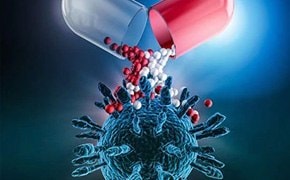Drug Delivery

Drug delivery is the method or process of administering drugs or pharmaceuticals and other xenobiotics to achieve a therapeutic effect in humans or animals. Various drug delivery technologies are utilized to promote therapeutic effects at the intended site of action while minimizing possible adverse effects, by impacting absorption, distribution, metabolism, and elimination (ADME) of a drug compound.
Featured Categories
Our NanofabTx™ reagent, microfluidic device, and nano polymer screening kits are optimized for rapid synthesis and control of nanoparticle drug delivery formulations with high cell viability.
We provide a broad portfolio of hydrophilic polymers grouped by their chemical structure for biomedical, catalysis, self-assembly and surface modification applications.
Keep your work flowing with our exceptional portfolio of versatile hydrophobic polymers to support your adhesion, coating, fiber, film, adhesion, engineered plastic and biomedical applications.
We offer poly(ethylene glycol) (PEG) and PEG solutions of different grades and molecular weights in different pack sizes.
Advances in medicine and biotechnology have led to the development of large number of new drug candidates, many of which fail during pre-clinical evaluation due to limited bioavailability, poor stability and low solubility. Drug delivery systems (DDS) are widely researched and developed to improve the pharmacokinetics and pharmacodynamics of therapeutic agents, to enable them to be delivered at the targeted site in the desired dose at the appropriate time and rate. Novel DDS, such as nano- and micro-particles, transdermal patches, inhalers, drug reservoir implants, and antibody-drug conjugates, are developed to meet advanced therapeutic needs including controlled release, targeted delivery, solubility enhancement, on-demand activation, and new administration routes (e.g., transdermal, ocular, nasal). The appropriate selection of DDS depends on the drug properties, desired release rate, desired site of action, and administration route.
Advances in nanotechnology have greatly improved drug design, enabling targeted, safe and effective drug formulations with nanoparticles (NP). Nanodrug delivery systems have demonstrated great potential in improving the solubility of hydrophobic drugs, enhancing biodistribution and pharmacokinetics, and providing preferential accumulation at the target site.
Nanodelivery systems can be designed to have drugs absorbed or conjugated onto the particle surface, encapsulated in the core, or dissolved within the particle matrix. Drug-loaded nanoparticles can be further targeted to a specific disease site by introducing targeting moieties onto the particle surface. Several nanocarriers such as liposomes, polymer micelles, dendrimers, polymer-drug conjugates, inorganic nanoparticles, and carbon-based nanomaterials have been employed in drug delivery formulation. Liposomes are the most common and well-investigated nanocarriers, while polymer nanoparticles have emerged as one of the most innovative approaches for drug delivery. Both natural and biocompatible synthetic polymers are used to fabricate polymeric drug delivery nanoparticles. Explore our NanoFabTx™ platform for more information.
Visit our document search for data sheets, certificates and technical documentation.
Related Articles
- Microfluidic assembly improves polyamine nanoencapsulation of nucleic acids, overcoming challenges like polydispersity and poor reproducibility.
- See All (1)
Related Protocols
Find More Articles and Protocols
How Can We Help
In case of any questions, please submit a customer support request
or talk to our customer service team:
Email custserv@sial.com
or call +1 (800) 244-1173
Additional Support
- Chromatogram Search
Use the Chromatogram Search to identify unknown compounds in your sample.
- /TH/en/support/calculators-and-apps
- Customer Support Request
- FAQ
Explore our Frequently Asked Questions for answers to commonly asked questions about our products and services.
To continue reading please sign in or create an account.
Don't Have An Account?



